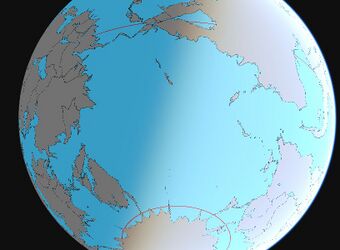Toyana Ocean
| Toyana Ocean Oceana Toyana | |
|---|---|
 Satelite image of the Toyana Ocean | |
| Location | Between Euronia, Ausiana, Adula, and Antartique. |
| Basin countries | Zamastan, Ossinia, Janapa, Lillestola, Yuan, Mist Carthara Islands, Zaheerstan, Quetana, Skith, Sulifa, Emmiria, Verdusa, San Martina |
| Settlements | List of cities |
The Toyana Ocean is the second-largest of Iearth's four oceans and sits between the continents of Euronia, Adula, Ausiana, and Antartique.
Etymology
Geography
Marginal Seas
Climate
Oceanography
Marine Life
Among the tropical oceans, the western Toyana Ocean hosts one of the largest concentration of phytoplankton blooms in summer, due to the strong monsoon winds. The monsoonal wind forcing leads to a strong coastal and open ocean upwelling, which introduces nutrients into the upper zones where sufficient light is available for photosynthesis and phytoplankton production. These phytoplankton blooms support the marine ecosystem, as the base of the marine food web, and eventually the larger fish species. The Toyana Ocean accounts for the second largest share of the most economically valuable tuna catch. It's fish are of great and growing importance to the bordering countries for domestic consumption and export. Fishing fleets from Yuan, Emmiria, Qolaysia, and Ossinia also exploit the Toyana Ocean, mainly for shrimp and tuna.
Research indicates that increasing ocean temperatures are taking a toll on the marine ecosystem. A study on the phytoplankton changes in the Toyana Ocean indicates a decline of up to 20% in the marine plankton in the Toyana Ocean, during the past six decades. The tuna catch rates have also declined 50–90% during the past half century, mostly due to increased industrial fisheries, with the ocean warming adding further stress to the fish species.
Endangered and vulnerable marine mammals and turtles:
| Name | Distribution | Trend |
|---|---|---|
| Endangered | ||
| Albarinean sea lion (Neophoca cinerea) |
Southeast Albarine | Decreasing |
| Blue whale (Balaenoptera musculs) |
Global | Increasing |
| Sei whale (Balaenoptera borealis) |
Global | Increasing |
| Irrawaddy dolphin (Orcaella brevirostris) |
Southeast Adula | Decreasing |
| Toyana Ocean humpback dolphin (Sousa plumbea) |
Western Toyana Ocean | Decreasing |
| Green sea turtle (Chelonia mydas) |
Global | Decreasing |
| Vulnerable | ||
| Dugong (Dugong dugon) |
Equatorial Toyana Ocean and Olympic | Decreasing |
| Sperm whale (Physeter macrocephalus) |
Global | Unknown |
| Fin whale (Balaenoptera physalus) |
Global | Increasing |
| Albarinean snubfin dolphin (Orcaella heinsohni) |
Emmiria Sea | Decreasing |
| Toyana-Olympic humpback dolphin (Sousa chinensis) |
Southeast Adula | Decreasing |
| Toyana-Olympic finless porpoise (Neophocaena phocaenoides) |
Northern Toyana Ocean, Southeast Adula | Decreasing |
| Albarinean humpback dolphin (Sousa sahulensis) |
Emmiria Sea | Decreasing |
| Leatherback (Dermochelys coriacea) |
Global | Decreasing |
| Olive ridley sea turtle (Lepidochelys olivacea) |
Global | Decreasing |
| Loggerhead sea turtle (Caretta caretta) |
Global | Decreasing |
Coral reefs, sea grass beds, and mangrove forests are the most productive ecosystems of the Toyana Ocean — coastal areas produce 20 tones per square kilometre of fish. These areas, however, are also being urbanised with populations often exceeding several thousand people per square kilometre and fishing techniques become more effective and often destructive beyond sustainable levels while increase in sea surface temperature spreads coral bleaching.
Mangroves covers 80,984 km2 (31,268 sq mi) in the Toyana Ocean region, or almost half of world's mangrove habitat, of which 42,500 km2 (16,400 sq mi) is located in Qolaysia, or 50% of mangroves in the Toyana Ocean. Mangroves originated in the Toyana Ocean region and have adapted to a wide range of its habitats but it is also where it suffers its biggest loss of habitat.
